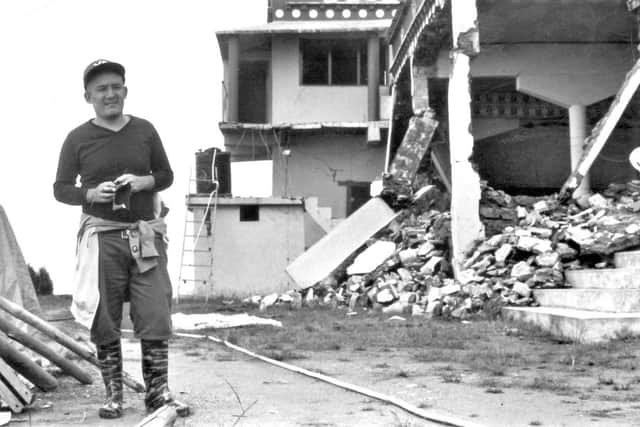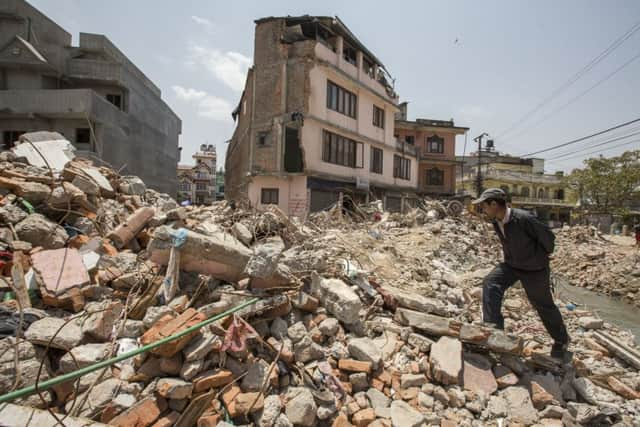Rebuilding lives with Christian's aid


With a nod towards the traffic trundling past on Albert Road, Christian Smith says: ‘Things like roads. As far as we’re concerned they’re just always there. Imagine if they weren’t.’
The ‘we don’t know how lucky we are’ theme is one to which he returns time and again.
Advertisement
Hide AdAdvertisement
Hide Ad‘Say an earthquake struck Portsmouth. All people would do is moan and then try to sue the companies that built the buildings which had just collapsed on people.’


The 22-year-old is just back from what he freely admits was a life-changing journey to Nepal where last April an earthquake killed more than 8,000 people and injured more than 21,000.
He lived in a village about 200km from the capital Kathmandu. ‘They lost their road and they’re still without it. It’s a five-hour walk to the nearest one and while I was there a man died from dehydration caused by violent diarrhoea because they couldn’t get him out of the village to hospital in Kathmandu.
‘All because there was no road.’
Christian works at the Wedgewood Rooms in Albert Road, marketing the independent music venue through social media.
Advertisement
Hide AdAdvertisement
Hide Ad

And it was via Facebook he was able to make his trip long after the devastation across Nepal had dropped off the news agenda and been pushed to the back of, if not out of, everyone’s minds.
What he saw made such an enormous impression he has set up a one-man crusade to raise money to rebuild the shattered village in which he was welcomed with warmth and humility. ‘They’re the most gracious people in the world and after what’s happened to them, they have no right to be,’ he says.
But his fundraising campaign will not see people’s cash going to the Nepalese government through official aid channels, but directly to the village to which he has now become emotionally twinned.
Christian, a former student at Horndean Technology College, had already travelled widely throughout south-east Asia when he booked the trip to Nepal last April.
Advertisement
Hide AdAdvertisement
Hide Ad

‘I wanted to do some trekking and exploring, but mainly I wanted to see the Himalaya.’
Then at midday on April 25 a massive swathe of the country was ripped apart by the earthquake which measured a colossal 7.8 on the Richter Scale with a second following in May of 7.3.
Christian adds: ‘It was at that point I decided I wanted to do something to help but I didn’t know what. I couldn’t just go over there and help with the rebuilding because that might have taken a job away from a local person.’
So he used Facebook to search for people affected by the earthquake with whom he could strike up a friendship. He found Tshering, a young man from a village called Gangyul in the Langtang National Park.
Advertisement
Hide AdAdvertisement
Hide Ad

‘There wasn’t one building in his village of about 200 people which wasn’t destroyed or badly damaged. Many were injured, but they were lucky because only about six people were killed.’
But that relative good fortune had a downside. ‘The government prioritised villages with the highest death tolls. Many, like Gangyul, were left to fend for themselves.’
Six months after the earthquake Christian flew into Kathmandu. ‘The government had spent most of the money donated by charities on rebuilding the tourist areas. There was no real aid getting through to remote villages like Gangyul. They were getting food but it was from monasteries, not the central government.
‘It’s a subsistence lifestyle. They eat what they can grow and sell what’s left over to make a little money.’
Advertisement
Hide AdAdvertisement
Hide AdNothing prepared him for the sights he would see outside the captial. ‘In Kathmandu, there were a few aid tents, but there were no real signs that anything significant had happened.
‘But as I headed the 200km to the village, towards the earthquake’s epicentre, it was just one flattened village after another.’
When he got to Gangyul he discovered what was akin to a shanty town. ‘Everyone was living in shells with corrugated iron sheets for roofs.
‘They had salvaged what they could from the rubble and put up four rough walls which weren’t weatherproof.’
Advertisement
Hide AdAdvertisement
Hide AdThen came the monsoon season and now it’s winter and they’re still living like that and will continue to do so until they can afford to rebuild.’
‘Because of the lack of a road that village is utterly isolated. All the medical care they get is brought in by the villagers themselves when they return from trips to Kathmandu.
‘That involves a five-hour walk to the nearest bus station then another five or six-hour bus journey into the city. It is such a far cry from what we have here – the little things we take for granted, like roads. Until you go there, you can’t imagine what not having a road can mean.’
Tshering, who was in Kathmandu when the earthquake happened, lost his aunt as well as his home. He showed the ruins to Christian and told him about one man in the village who was working in the fields when the ground began to shake.
Advertisement
Hide AdAdvertisement
Hide Ad‘His granddaughter, who is about six, was indoors and was buried under the rubble. He dragged her out, but she had a badly fractured skull and they had to wait six days for a helicopter to turn up to take her to hospital in Kathmandu where she spent a month in intensive care.’ She survived.
Christian adds: ‘But despite all this hardship the people keep on smiling. They’re used to dealing with the monsoon and bitter winters; they’re used to rebuilding homes after storms, but it goes against their mindset not to be hospitalable and welcome you into their makeshift homes and share their food with you.
‘It’s very humbling and simply makes you realise how lucky we are.’
Christian Smith set out to help the people of the village of Gangyul before he left for his month-long stay in Nepal.
But he was not sure how.
Advertisement
Hide AdAdvertisement
Hide AdHe says: ‘It was only when I got there it became obvious the things they needed money for most urgently was for help clearing the rubble and for stretchers.’
He adds: ‘The remains of their homes are all around them and a constant reminder of the earthquake. Yet still they remain cheerful and optimistic. You wonder how.’
As for stretchers. ‘Because the village has no road connection any more, anyone who falls ill has to be carried off the mountain and for five hours to the nearest road. It’s impossible without stretchers. So people are dying like the man with diarrhoea and another who simply had ‘flu but couldn’t be taken to hospital.’
Christian has made a film of his visit to Nepal and posted it on a gofundme page which you can see at portsmouth.co.uk.
Advertisement
Hide AdAdvertisement
Hide AdIt features interviews with his new ‘friend for life’ Tshering who also guides Christian around his devastated village.
Donations can be made via that page.
Christian adds: ‘Any money donated will go straight to the village, not through any government agency to be lost in the system.
‘The people of Gangyul village have formed a committee and they will decided how best to spend donations.’